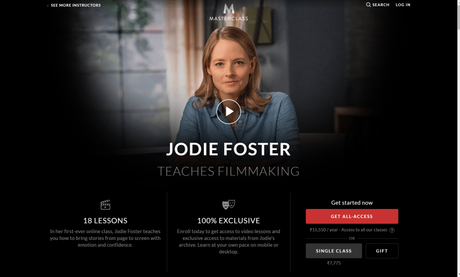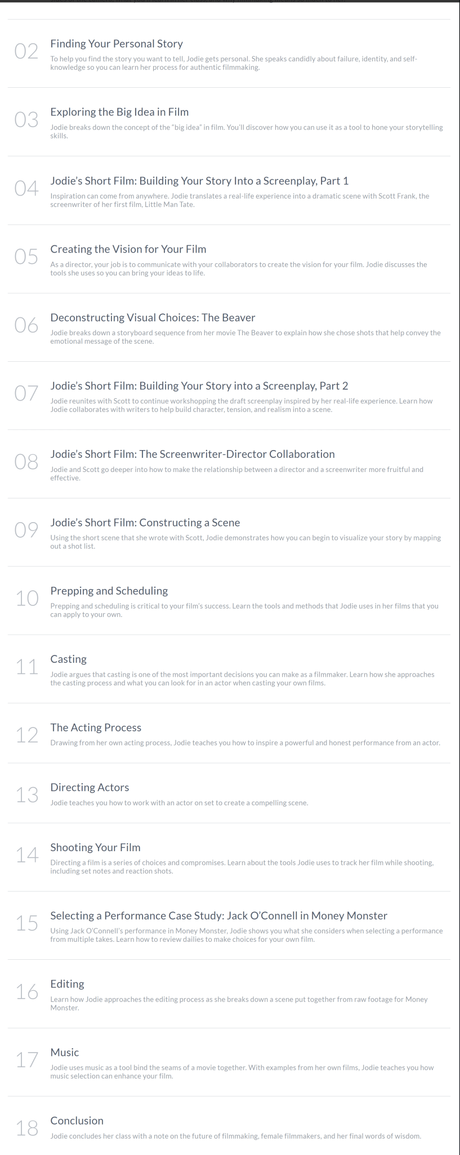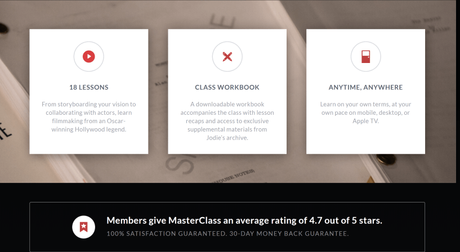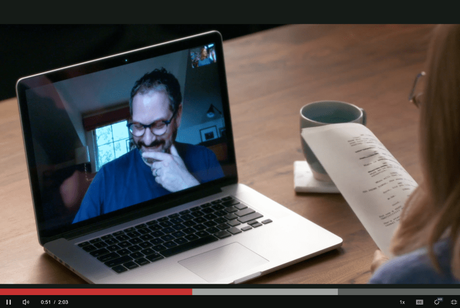In this post, we have shared the Jodie Foster MasterClass Review 2019 with all its video modules and course pricing as well as the detailed description of Jodie. Read here!!
Who is Jodie Foster?
Jodie Foster is associate degree award-winning American actor well-known for her roles within the films Taxi Driver, The accused and therefore the Silence of the Lambs.
American actor, director, and producer Jodie Foster was born on November nineteen, 1962, in la, California. Foster received an Oscar nomination at age 12 for her role as a child prostitute in Martin Scorsese's film Taxi Driver (1976) and went on to win a Golden Globe (best actress) and honor for The accused (1988). She then starred in the popular film The Silence of the Lambs (1991). In recent times, Foster has worked as an excellent film director and as well, producer, in addition to acting.
Early Career and Education
A precocious and bright child from the start, Foster began talking at nine months and had taught herself to read by the time she was 3 years old. Despite never having taken an acting class, she dove headlong into show business in 1968 with her first television show, Mayberry R.F.D.
From there, she would continue on to a busy career as a baby actor, with Brandy Foster always by her side, playing the dual role of manager and mother. "My mom was my manager when I was young," Foster later recalled. "I still treasure her impact. She was very strong, self-educated, but wasn't pushy. She'd stay in the trailer and read magazines while I worked."
Foster's first foray onto the big screen came with roles in the Disney movies Napoleon and Samantha (1972) and One Little Indian (1973). All the while, Foster was studying at the private prep school Le Lycée Français de Los Angeles, juggling a challenging course load and becoming fluent in French.
Foster's lingering and disputed prison-breaking film role came once she was solely twelve years previous. Taxi Driver (1976), a famous and dull Martin Scorsese picture set in the abrasive underbelly of 1970s-time New York, saw Foster playing a youngster prostitute who turns into the obsession of the title character, played by Robert De Niro.
Taxi Driver garnered Foster associate degree Academy Award nomination, establishing her as a teenage star and leading to roles in popular films like Freaky Friday (1976) and Foxes (1980), further cementing her place as Hollywood's next darling.
Acclaimed Actress and Director
After graduating from Yale, Foster made the transition from child star to mature actress, appearing in a series of mostly unremarkable pictures through the mid-1980s. Her next widely acclaimed role came in another intense and gritty picture when she played rape survivor Sarah Tobias in The Accused (1988). For this performance she won both an Academy Award and Golden Globe for Best Actress, establishing her as one of Hollywood's most esteemed serious actresses.
Foster made a strong impression again in 1991 with her performance as FBI agent Clarice Starling in the blockbuster hit The Silence of the Lambs (1991), in which Foster's character goes head to head with the unforgettable psychopath Hannibal Lecter, played by Anthony Hopkins. Foster got her second Academy Award and Golden Globe for this role.
Firmly established collectively of Hollywood's biggest stars and enjoying the skilled and money freedom to follow a unique path, Foster turned to direct movies and shows.
When asked about the differences between acting and directing, she said, "Well, you have control, but you also have 175 people involved. Acting, for me, is exhausting. I'm always so energized by directing. It's more intense to direct. I will get into and specific myself, then pop out again. It's a huge passion for me." Her feature-film directorial debut, Little Man Tate (1991), won widespread plaudits from critics.
Jodie Foster MasterClass Review 2019: Is It Worth Your Money?

What you get within the Jodie Foster Teaches Filmmaking MasterClass
Here's the list:
- 4+ hours of video content and 18 modules covering Jodie's approach to filmmaking
- A class workbook with a filmmaking assignment to see you through the course, crammed with creative exercises and extra information about everything Jodie covers
- Script first drafts, film vision creation guide, scene case studies, short films, shot lists, sample filmmaking schedule
- Office Hours where you can submit a video question to Jodie Foster and get a video answer back
- A great filmmaking student community where you can interact with other students and find project collaborators
What is MasterClass?
Entrepreneur Aaron Rasmussen and film editor and director David Rogier started MasterClass in 2015. Based in San Francisco, it's an online education platform for creative professionals.
Of course, you don't need to travel to San Francisco to take a MasterClass.

You can watch MasterClass courses using your computer or phone and consume the materials at your own pace.
As a student, you can learn the art of comedy from Steve Martin, writing thrillers from James Patterson, dramatic writing from David Mamet, screenwriting from Aaron Sorkin and lots more.
It is a great way of learning online from top creators you would not normally have access to.
Who is MasterClass For?
The MasterClass is for writers, photographers, artists, musicians, painters, and creative professionals. It's ideal for students who are happy to learn at their own pace using a computer.
Unlike Lynda or Treehouse, MasterClass is suitable for writers, musicians, artists, and creative professionals.
This is an interesting niche.
Many of the opposite online courses I've taken facilitate students learn business skills like promoting or additional sensible skills like writing or internet development basics.
The MasterClass isn't ideal for people who thrive in classroom environments and prefer a more hands-on approach from teachers.
Jodie Foster MasterClass Review - The Lessons
The first few lessons in the Jodie Foster MasterClass cover the big picture of directing:
The Jodie Foster MasterClass then takes a slightly more practical focus, tracking the development of a short film to show how a director works. Jodie Foster explains how the inspiration for the idea came from her personal experience.
- finding your personal story
- exploring the big idea in the film
- creating the vision for your film
Several lessons then show the process of transforming this inspiration into an actual film. Two lessons show how Jodie Foster workshops the script with a screenwriter, and further lessons show how she would prepare a shortlist, storyboard and schedule.

The downside is that, after seeing all the preparation, we don't see this short film actually being made. It would have been useful to see the same example used for lessons on casting, shooting and editing.
The insight into collaboration, especially the relationship between writers and directors, is useful, but following this project from script to screen could have also brought in cinematographers, actors, producers, editors, and so on.
She also backs up her advice with examples from the better-known films she's acted in.
The role of a director on TV is often different from their role in the film. Jodie Foster has directed episodes of HOUSE OF CARDS, ORANGE IS THE NEW BLACK and BLACK MIRROR.
There are a few behind the scenes images showing her directing them, but it would have been interesting for the Jodie Foster MasterClass to touch on these experiences and how they differ from the film.
Director-actor relationship
Several key lessons specifically focus on the director-actor relationship:
It's in this area that the Jodie Foster MasterClass shines. Like other actors turned directors, Jodie Foster has decades of relevant experience behind her.
She knows first-hand, what actors want to and needs to hear. Her first piece of advice - that directors should try acting themselves - is spot on.
She also likens directing actors to parents. It might sound patronizing, but coming from an acclaimed, award-winning actress, one who's directed George Clooney, Julia Roberts, Jennifer Lawrence, Robert Downey Jr., et al, it's worth trusting her on this one.
The Workbooks
Jodie Foster MasterClass workbook is available to download in individual chapters, one for each lesson. It's also available in one solid PDF document, which makes it a bit easier to navigate and go between lessons. Exercises will often refer back to previous exercises so it's best to go in order.
The most interesting exercises revolve around creativity. In one lesson, Jodie Foster explains how she would have made the film THE MARTIAN personal to her - keeping the same premise but changing the tone and emphasis of the story.

This exercise is a great way to draw inspiration from films around you without being derivative. (And, important for working in the industry, being diplomatic about whether you liked other people's work!)
As the Jodie Foster MasterClass goes on, the exercises focus more on how to apply what you've learned from studying other films to your own work.
Making that jump from theory into practice is a difficult one, and it's one inevitable downside of the MasterClass format that it's entirely up to the class participant to carry it out.
Other resources in the Jodie Foster MasterClass relate to the short film that she works on. Included are two versions of the script with Jodie Foster's annotations, an example of a storyboard and floor plan for a scene, and an example of a schedule.
These extras really need to be consulted alongside their respective lessons in order to make sense. Her storyboard, in particular, is hard to decipher without her accompanying explanations. (Again, this is part of the lesson, that it doesn't matter how well you can draw when creating storyboards just for your own use.)
Community & Interactivity
As with the Martin Scorsese MasterClass, participants are encouraged to comment below each lesson and participate in the "Hub", a community forum.
However, while they begin with enthusiasm the comments definitely trail off as the class goes on. A few people to share their responses to the exercises, but these can be quite personal so it's understandable to keep them private.

Instead, most comments are just expressing simple enthusiasm or are self-promotion.
Similarly, some class participants to share their work on the Hub, but it's mostly a general discussion forum and not particularly active.
The MasterClass is not a substitute for building a real-life network and community around you, especially as course participants come from all over the world and take the class at different times.
Value
The MasterClass courses are all well produced and presented. There are fewer lessons in the Jodie Foster MasterClass (18) than in others. However, they vary in length, with the more in-depth ones running up to 20 minutes, so the overall class time evens out.
The exercises can take as much time as you're willing to give them, but the more dedicated will find it the most rewarding.
It's a one-time purchase for lifetime access to the Jodie Foster MasterClass, or an annual subscription for access to every MasterClass. If you're planning to do multiple classes, the annual subscription would work out cheaper.
There's an 'Office Hours' feature for Jodie Foster to view student work and questions and offer feedback, but it's not clear if or when there'll be content added there.
Pros and Cons
MasterClass Pricing Plans
Pros:There are two ways by which you can purchase a MasterClass, a single MasterClass and an All-Access Pass for any of the gurus on the platform.
- The actor-director background creates a unique perspective
- Strong focus on how writers and directors collaborate
- Additional class materials and looks off camera give great context

- The example short film isn't followed all the way from script to screen
- Examples are from Foster's own films, not the most well-known or acclaimed
- Not a technical director, lessons center more around collaboration and people skills
The All- Access Pass comes in real handy when you wish to take more than one MasterClass, so this means that there is no limit on the number of MasterClasses on the All Access Pass.
A 30-day money-back guarantee is also available for any of the MasterClass packages you purchase and you will get a complete refund of the amount in case you are not satisfied with their services.
Also Read:
Final thoughts: Is Jodie Foster MasterClass Worth It? Jodie Foster MasterClass Reviews
In the Jodie Foster MasterClass review. we already said that it offers a different perspective on directing. As you might expect, there's a great focus on actors and how to work with them. Structuring many of the lessons around developing a short film, even though it's never made, is a great conceit.
This is far closer to participants' experiences than making a big Hollywood film full of stars.
Jodie Foster might be less of an auteur name director compared to others who teach MasterClasses. But while directing is an art, it's also a craft and a leadership position. Working well with others is a severely underrated skill for a director to have, and it's learning about this that makes the Jodie Foster MasterClass worth taking.
This was our Jodie Foster MasterClass Review 2019. Get the All-time access plan here.


